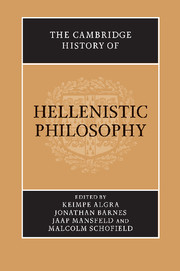Book contents
- Frontmatter
- PART I INTRODUCTION
- PART II LOGIC AND LANGUAGE
- 4 Introduction
- 5 Logic
- 6 Language
- PART III EPISTEMOLOGY
- PART IV PHYSICS AND METAPHYSICS
- PART V ETHICS AND POLITICS
- Synopsis of principal events
- Editions of sources and fragments
- List of abbreviations
- Bibliography
- Index locorum
- General Index
- References
6 - Language
from PART II - LOGIC AND LANGUAGE
Published online by Cambridge University Press: 28 March 2008
- Frontmatter
- PART I INTRODUCTION
- PART II LOGIC AND LANGUAGE
- 4 Introduction
- 5 Logic
- 6 Language
- PART III EPISTEMOLOGY
- PART IV PHYSICS AND METAPHYSICS
- PART V ETHICS AND POLITICS
- Synopsis of principal events
- Editions of sources and fragments
- List of abbreviations
- Bibliography
- Index locorum
- General Index
- References
Summary
Linguistics
The study of language
In the classical period, the Greek language was studied by philosophers, sophists and rhetoricians, and the contributions of Aristotle and Theophrastus in particular are very valuable. But only in the Hellenistic era does grammar show significant development and almost becomes a discipline in its own right. Although their origin as students of poetry is never forgotten, grammarians now start to be acknowledged as teachers and scholars in the fields of phonology and morphology. To some extent they also study syntax and pragmatics, while semantics provides, as it were, their basic approach. This development is the result of the concurrence of three kinds of linguistic analysis: in philosophy, rhetoric and scholarship. Students of each of these disciplines look at language from their own specific point of view and in a different context. Thus, philosophers, especially Stoics, are interested in the nature of language and its relationships to reality and knowledge, and analyse speech in the context of their study of logic, which analysis has its consequences for their physics and ethics. Rhetoricians are more concerned with ways of manipulating people by means of language; and scholars develop tools for language analysis in order to edit and explain the texts of Homer and other poets. These different concerns greatly advance the study of language although the complete emancipation of grammar as a discipline to be studied for its own sake, like mathematics, is not achieved in this period.
- Type
- Chapter
- Information
- The Cambridge History of Hellenistic Philosophy , pp. 177 - 226Publisher: Cambridge University PressPrint publication year: 1999
References
- 45
- Cited by

